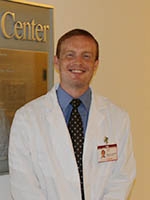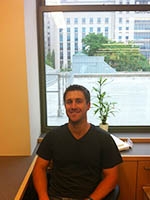Two of Weill Cornell Medical College's medical students have earned coveted spots in the Howard Hughes Medical Institute's Medical Research Fellows Program.

Daniel Cook
Third-year medical student Daniel Cook and second-year Andrew Gregg were invited to participate in the highly-selective program, enabling them to take the next year off from school to conduct original research.
"It's a great honor to be selected for the HHMI Fellowship," said Gregg, 25, of Menlo Park, Calif. "It's a very prestigious fellowship and a great opportunity to become fully immersed in research that I find very interesting and exciting."
Cook and Gregg are two of 69 students from 32 different schools across the United States selected for the fellowship. This year, more than 250 students applied for the program, which is a 10 percent increase over last year's submissions.
"We are absolutely thrilled for Daniel and Andrew," said Dr. Brian Lamon, assistant dean for research development, director for medical student research and assistant professor of pathology and laboratory medicine at Weill Cornell. "In this day and age of incredibly competitive funding, every bit of recognition helps in terms of letting the world know about the exciting and top-notch research being conducted at Weill Cornell."
The fellowship is a year-long program awarded to medical, dental and veterinary students looking to immerse themselves in a research position. The program's annual $2.5 million endowment is used to solidify and expand the country's pool of future physician-scientists and medically-trained researchers.
"The Howard Hughes Medical Institute is one of the largest but also most prestigious private organizations funding biomedical research," Dr. Lamon said. "Only the best and the brightest students, or faculty for that matter, are recognized by the institute's mechanisms of research support."

Andrew Gregg
The fellowship could offer many rewards, but perhaps most fundamentally is the opportunity for them to develop into capable physician-scientists. They hope that this experience will engage them in the process of basic science research in depth, and placing it into, as Cook described, a "medical context."
During his year of research, Cook will work with Dr. Hugh Hemmings, chair of the department of Anesthesiology, the Distinguished Research Professor in Anesthetic Mechanisms, professor of anesthesiology and of pharmacology at Weill Cornell Medical College. The focus of Cook's research will be the molecular mechanisms of volatile anesthetics. Cook hopes his research will contribute to a growing collection of evidence toward establishing the importance of presynaptic sodium channel modulation in producing the effects of anesthetics.
"HHMI is a great opportunity because the organization is willing to fund so many different types of projects," said Cook, 25, from Dover, Mass. "Dr. Hemmings has been wonderful in discussing his research with me and helping me to select a project that I find fascinating and that is relevant to my future as an anesthesiologist."
Andrew Gregg's place of study will be a few streets away at The Rockefeller University. He'll work with neuroscientist Dr. Marc Tessier-Lavigne, president of The Rockefeller University and the Carson Family Professor. Gregg has previous experience with Dr. Tessier-Lavigne's lab, working there a few years ago when it was located at Genentech, Inc. in San Francisco, Calif. Gregg hopes that his research will enhance our current understanding of the mechanism underlying Alzheimer's disease, with a specific focus on the function of tau, a protein which is speculated to play a significant role in disease progression.
Both Cook and Gregg will be able to chart new territory in their scientific explorations, discovering as much about their respective fields of study as they will about what it takes to be successful researchers.
"In medical school, we get the opportunity to ask the question 'Why?' and are directed to the answer, if one currently exists," Gregg said. "The fellowship enables us to ask questions for which there are no answers, and then get our hands dirty in trying to solve them."

